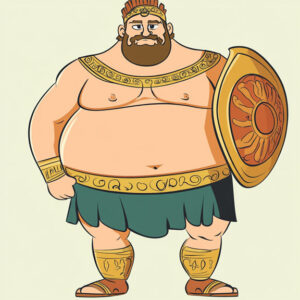 While one of many heroes in the Iliad, Odysseus is the main character of the Odyssey. He is characterized as possessing many positive traits, especially intelligence. While President Trump clearly lacks the intellectual keenness and skill at counsel of Odysseus, there are some interesting parallels between the two.
While one of many heroes in the Iliad, Odysseus is the main character of the Odyssey. He is characterized as possessing many positive traits, especially intelligence. While President Trump clearly lacks the intellectual keenness and skill at counsel of Odysseus, there are some interesting parallels between the two.
Odysseus is famously presented as a skilled deceiver and fond of adultery (his own, of course). While his fellow heroes benefit from his cunning, Achilles and others regard him as a liar and condemn him for this. For the heroes of the Republican party, Trump occupies a similar role: they are pleased when he wins and assists them in winning but once found his lies and immoral actions (such as adultery) troubling. Trump, like Odysseus, is a master of deceit and disguise. For example, Trump has presented himself as a populist enemy of the elites while, at the same time, surrounding himself with billionaires. Like Odysseus, Trump achieves victory through cunning and deceit—and thus deserves all the praise due such success.
While no one likes to lose, both Trump and Odysseus are obsessed with wining. Odysseus makes it clear that he wants to win in everything. One of Trump signature lines was that were he president, we would win so much we would be tired of winning. Trump did lose his second run for President but won in his third attempt. There is even talk of a third term. While winning is generally seen as good, there is the question of what it means to be a victor.
In the case of Odysseus, being a victor means getting what he desires, despite the contrary wishes of friends or foes. “Odysseus’ outlook threatens to make nonsense of morality in the broadest sense: including those values that provide a guide for conduct in situations affecting the well-being of others, imposing constraints on what one may do in pursuit of personal gain.” Odysseus is thus someone who “disregards moral constraints to do anything at all in pursuit of his or her own goals.” Trump, famously, takes the same approach: he pursues what he wants and does not let concerns about ethics or the interests of others interfere. While this might seem to make both Odysseus and Trump villains, it must be remembered that Odysseus is the (complicated) hero of the Odyssey. Likewise, Trump is a hero to his followers. This raises the question of how this is possible.
One tempting explanation is that Trump’s followers are somehow still deceived: they do not know what Trump truly is. If they knew, they would abandon him. But this view is, in many cases, implausible. While Trump’s supporters claim he is honest, religious, and acting in their interest their support is (usually) not the result of ignorance. Rather, as others have argued, they see Trump as acting against their enemies and his unethical behavior as justified because it is aimed at these enemies. Trump is, as his followers point out, “winning” and fighting against the “enemies of the people.” In this regard, Trump is much like Odysseus. He exemplifies the pre-Socratic “warrior-king” virtues. This is being strong, doing anything to win, and providing his friends with a cut of the spoils.
Most importantly, this “warrior-king” promises to harm the perceived enemies of his followers and those they disike. If the “warrior-king” convinces his followers that he is hurting their enemies and protecting their share of the loot, they praise and follow him. If Trump was seen as losing, if he stopped attacking their enemies and could no longer convince his followers that he is protecting their share of the loot, then he would lose support. However, as long as he keeps hurting the right people and is seen as winning, then the loyalty of his base is assured. Ethical violations do not matter, unless they are violations that help the enemies of his followers. As such, his followers do not care about his adultery, they do not care about his lies, and they do not care about any collusion, crimes or other misdeeds. What matters to them is what matters to Trump: believing they are winning, and their enemies are losing.
